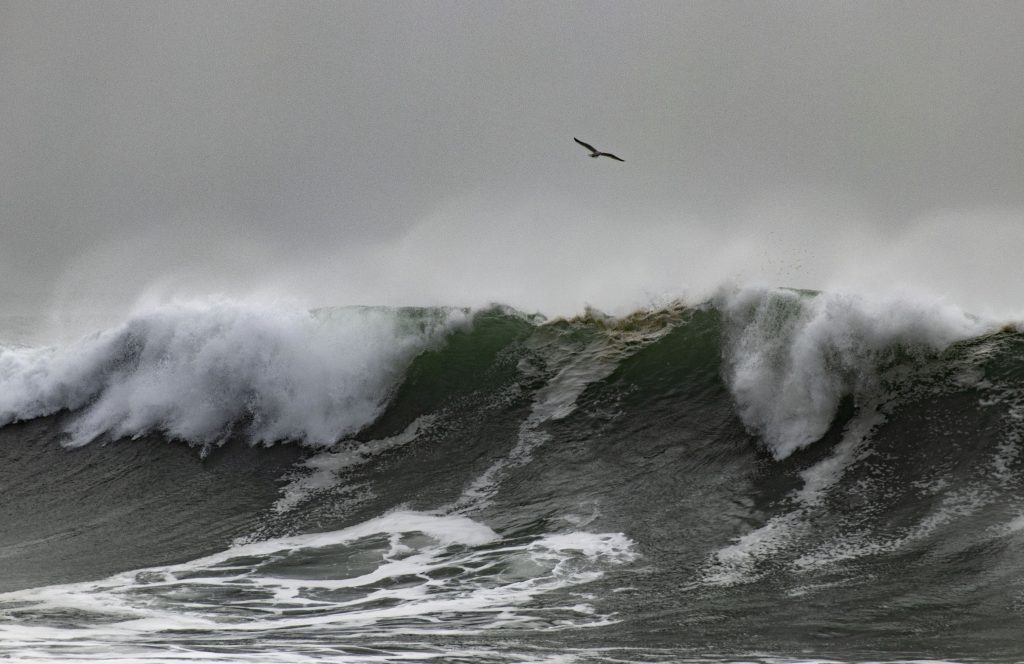Wave Action – Young Curator Blog
Coastal Erosion
Recently the coast of Cornwall was hit by an impressive swell, with waves of over 20ft tall. Porthcurno was no exception to this, with huge waves rolling much further up the beach than usual and crashing into the headlands either side. It was an impressive sight to see and was certainly some of the biggest waves I have seen in Cornwall. However, the sheer power of the swell got me thinking about the impacts this could have on the coastal landscape as well as the effects of climate change on the power of the ocean.
Coastal erosion is a natural phenomenon by which wave action acts against coastal features, slowly eroding them over many years. There are four types of coastal erosion: corrasion (wearing away of sediment by a force hitting them), hydraulic action (water forces its way into gaps in rocks and breaks off chunks), corrosion (chemical effect of water dissolving and washing away minerals, as well as weak acids eroding certain types of rock), and attrition (rocks and pebbles being thrown against the coast, causing damage). As a wave gets stronger and more forceful the effects of corrasion, hydraulic action and attrition become more severe than usual.

Global wave power
Studies have found that global wave power increases by 0.4% each year and that there is a direct correlation between surface temperature of the ocean and wave power, upper ocean warming has the effect of stronger wave power. The increased temperature of our ocean is of course a direct result of climate change, the ocean absorbs 90% of the additional heat caused by global warming. In fact, studies suggest that for the past 150 years, the ocean has absorbed the equivalent energy of an atomic bomb explosion per second!
Threat to coastal communities
Although coastal erosion is a natural process, the speed and strength at which it is now happening is not. The increased effects of wave power on land can be devastating for coastal towns and communities. By 2080, the sea level of the UK is set to rise by 1-2 meters and there are set to be more frequent, stronger storms hitting the coasts. The heightened wave power and rising sea levels caused by climate change create a surge of floods and damage to land and property, with some homes being completely lost to the ocean. Not only is there a concerning impact on human life in seaside settlements, but a cost to the UK’s rich ecosystems. With more and more land being washed away each year, the habitat of many animal species is lost, for example coastal wetlands. Many species could become endangered or lost because of salt accumulation on land and increased floods.
Measures to combat global warming
However, there is a way to decrease the effects of coastal erosion and heightened wave power, which is by battling global warming. Ways we can do this as individuals include: switching as much as possible to renewable energy sources; a decrease in buying disposable plastics, metals and glass, and switching to reusable alternatives; using fuel efficient cars and taking public transport, walking or cycling where possible; turning off lights and appliances when not in use; decreased buying from fast fashion brands which are usually energy and water intensive as well as unsustainably sourced; and going vegetarian, vegan or just having less meat in the week. Livestock contributes to a whopping 14.5% of the world’s greenhouse gas emissions each year!

In conclusion, although the occasional big swell is bound to happen at least once every couple of years and is amazing to watch, it is important to try and decrease the likelihood of it becoming a more frequent and far more devastating event. As individuals we can work to help preserve our beautiful coasts along with the people and animals that live there.
Maeve Cushla, Young Curator, PK Porthcurno
https://toolkit.climate.gov/topics/coastal-flood-risk/coastal-erosion
https://www.nature.com/articles/s41467-018-08066-0
https://youmatter.world/en/climate-change-causes-the-increase-of-wave-energy
https://earthsky.org/earth/study-oceans-absorbed-more-heat-questions
https://sciencing.com/about-6085011-erosion-effects-ecosystem.html
https://www.bbc.co.uk/news/uk-23803520
